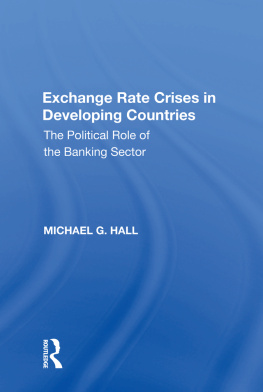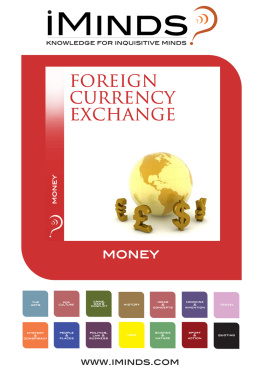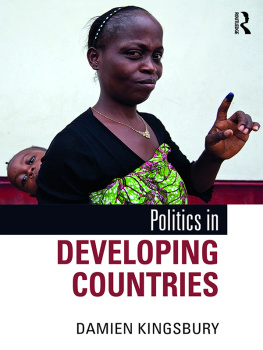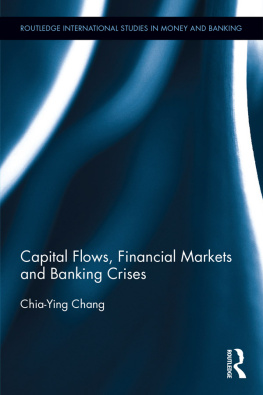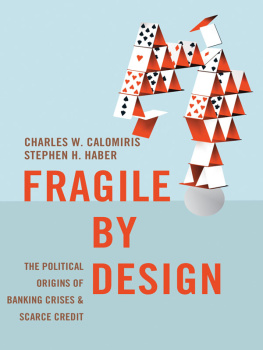Michael G. Hall - Exchange Rate Crises in Developing Countries: The Political Role of the Banking Sector
Here you can read online Michael G. Hall - Exchange Rate Crises in Developing Countries: The Political Role of the Banking Sector full text of the book (entire story) in english for free. Download pdf and epub, get meaning, cover and reviews about this ebook. year: 2006, publisher: Routledge, genre: Politics. Description of the work, (preface) as well as reviews are available. Best literature library LitArk.com created for fans of good reading and offers a wide selection of genres:
Romance novel
Science fiction
Adventure
Detective
Science
History
Home and family
Prose
Art
Politics
Computer
Non-fiction
Religion
Business
Children
Humor
Choose a favorite category and find really read worthwhile books. Enjoy immersion in the world of imagination, feel the emotions of the characters or learn something new for yourself, make an fascinating discovery.
- Book:Exchange Rate Crises in Developing Countries: The Political Role of the Banking Sector
- Author:
- Publisher:Routledge
- Genre:
- Year:2006
- Rating:5 / 5
- Favourites:Add to favourites
- Your mark:
- 100
- 1
- 2
- 3
- 4
- 5
Exchange Rate Crises in Developing Countries: The Political Role of the Banking Sector: summary, description and annotation
We offer to read an annotation, description, summary or preface (depends on what the author of the book "Exchange Rate Crises in Developing Countries: The Political Role of the Banking Sector" wrote himself). If you haven't found the necessary information about the book — write in the comments, we will try to find it.
Michael G. Hall: author's other books
Who wrote Exchange Rate Crises in Developing Countries: The Political Role of the Banking Sector? Find out the surname, the name of the author of the book and a list of all author's works by series.
Exchange Rate Crises in Developing Countries: The Political Role of the Banking Sector — read online for free the complete book (whole text) full work
Below is the text of the book, divided by pages. System saving the place of the last page read, allows you to conveniently read the book "Exchange Rate Crises in Developing Countries: The Political Role of the Banking Sector" online for free, without having to search again every time where you left off. Put a bookmark, and you can go to the page where you finished reading at any time.
Font size:
Interval:
Bookmark:
Director, Institute of Commonwealth Studies, University of London, UK
Isidro Morales, Universidad de las Amricas, Puebla, Mexico
Maria Nzomo, Embassy of Kenya, Zimbabwe
Nicola Phillips, University of Manchester, UK
Johan Saravanamuttu, Science University of Malaysia, Malaysia
Fredrik Sderbaum, Gteborgs Universitet, Sweden
Dynamics of Change in the New World Order
Edited by Henry Veltmeyer
The Role of Spanish Firms
Edited by Flix E. Martn and Pablo Toral
Humanitarian Intervention and Peacebuilding in Perspective
Edited by Natalie Mychajlyszyn and Timothy M. Shaw
A Global Political Economy Perspective
Paul Close and David Askew
University of Northern Iowa, USA

2 Park Square, Milton Park, Abingdon, Oxon, OX14 4RN
711 Third Avenue, New York, NY 10017, USA
Product or corporate names may be trademarks or registered trademarks, and are used only for identification and explanation without intent to infringe.
The publisher has gone to great lengths to ensure the quality of this reprint but points out that some imperfections in the original copies may be apparent.
The publisher has made every effort to trace copyright holders and welcomes correspondence from those they have been unable to contact.
ISBN 13: 978-1-351-15844-2 (ebk)
- ii
- APRA American Popular Revolutionary Alliance (Peru)
- BBC Bangkok Bank of Commerce (Thailand)
- BIBF Bangkok International Banking Facilities (Thailand)
- BIS Bank for International Settlements
- BOT Bank of Thailand
- CBI Central bank independence
- CFA African Financial Community
- CNBV National Bank and Equities Commission (Mexico)
- CPI Consumer price index
- DNP National Planning Department (Colombia)
- EAER Exchange Arrangements and Exchange Restrictions
- EMU European Monetary Union
- ERR Exchange-rate regime
- FDI Foreign direct investment
- FDN National Democratic Front (Mexico)
- FIDF Financial Institutions Development Fund (Thailand)
- GDP Gross domestic product
- HOT Hollowing-out thesis
- IBM International Business Machines
- IFC International Finance Corporation
- IFS International Financial Statistics
- IMF International Monetary Fund
- LIBOR London Interbank Offered Rate
- NAFTA North American Free Trade Agreement
- NIC Newly industrializing countries
- NPL Non-performing loans
- OCA Optimum currency area
- OECD Organization for Economic Cooperation and Development
- PAN National Action Party (Mexico)
- PRD Democratic Revolutionary Party (Mexico)
- PRI Institutional Revolutionary Party (Mexico)
- SDR Special drawing rights
- SET Stock Exchange of Thailand
- SOE State-owned enterprises
- TBA Thai Bankers Association
- TED Total external debt
- UIP Uncovered interest parity
- WDI World Development Indicators
Font size:
Interval:
Bookmark:
Similar books «Exchange Rate Crises in Developing Countries: The Political Role of the Banking Sector»
Look at similar books to Exchange Rate Crises in Developing Countries: The Political Role of the Banking Sector. We have selected literature similar in name and meaning in the hope of providing readers with more options to find new, interesting, not yet read works.
Discussion, reviews of the book Exchange Rate Crises in Developing Countries: The Political Role of the Banking Sector and just readers' own opinions. Leave your comments, write what you think about the work, its meaning or the main characters. Specify what exactly you liked and what you didn't like, and why you think so.

